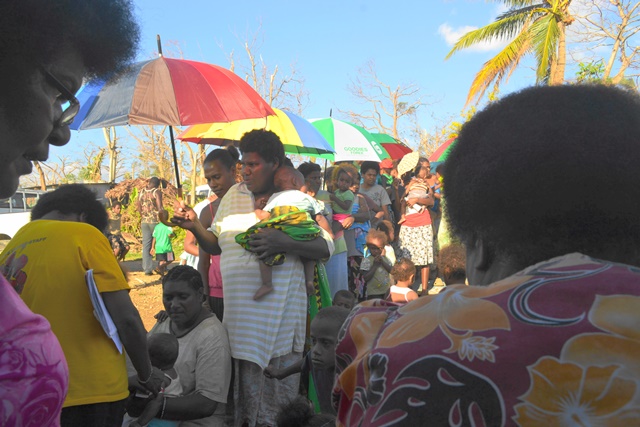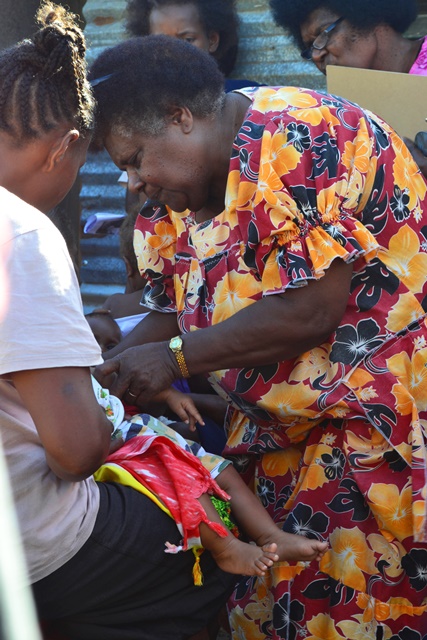A nursing graduate of 1968, Margaret Saul did not attain midwifery prerequisites until 1987: with good reason having to juggle a nursing career and family-- which involved raising eight children, four biological and four adopted - after her 1970 marriage.
Ms Saul has done her bit for national health but we meet as part of a Vanuatu Ministry of Health and United Nations Population Fund (UNFPA) integrated Cyclone Pam community outreach team, the first to visit Fresh Wind Ohlem, just outside the capital, Port Vila
Her delightful banter during her break from her designated role of consulting lactating mothers and examining infants belied the back-breaking work she was resting from; she speaks warmly of her retirement, which actually led to a position in one of the Neil Thomas Ministry clinic, a faith-based organisation which includes clinics in its assistance to the local community.
Ms Saul's years of experience was a calming influence that hot humid and somewhat overwhelming afternoon, as the team which was expecting 40 lactating mothers and pregnant women now had to "treat" almost 100 women and children who stood in line across the main road of the settlement.
The selfless commitment of humanitarian workers despite the dangers that most of them are exposed to is one of the aspects of World Humanitarian Day that UNFPA celebrated this year - saluting them for their work in crisis situations ensuring survival was with dignity and with lived human rights.

In 2013 alone, a record 155 aid workers were killed, 171 seriously wounded and 134 were kidnapped. In 2014, the world was battered by 400 disasters - of the world's reported natural disasters between 2004 and 2013, 41.2 per cent or 1690 incidences occurred in the Asia and the Pacific region.
More than 1.2million people have reportedly died in Asia and the Pacific disasters and economic damage between 2004 and 2014 was reportedly more than $560 billion.
"We worked with partners in our response to Cyclone Pam; activities included information centres where they could go for sexual and reproductive health information, community outreach clinics like Ms Saul was involved in and facilitating retired midwives from Fiji," UNFPA Pacific Director and Representative Dr Laurent Zessler said.
"UNFPA works to provide sexual and reproductive health services to ensure safe birth even in the most difficult circumstances; country programs which includes work with organisations like Vanuatu Family Health means women were able to access contraceptives immediately after the cyclone."
The Vanuatu Central Hospital's maternity ward nurse-in-charge Janet Leitangi, who worked for 36 hours through the night of March 13 as Cyclone Pam pummeled the island nation with its Category 5 gusts, said at the time that when she saw Fijian midwives walk into the ward, it had brought her "so much relief".
One of the Fiji midwives, Alisi Volavola Sefeti said when she was asked if she wanted to be part of the first group: "All I thought was: somebody needs my service".
Emergencies change lives in sudden and fundamental ways that for the most part, survivors have to unlearn what was status quo and learn a new"normal"; damage can be infrastructural and about getting services back on while for some, damage is to the personal, as it may be about resettling into refugee camps or relocating as a village, severing ties to customary land one's people have known for centuries.
In "normal" times, unwanted pregnancies are estimated to number 87 million per year; about 46 million of them resort to induced abortion and about 18 million do so in unsafe circumstances - 3.2 million adolescents have unsafe abortions annually.
Each year, modern contraceptives prevent 2.7 million needless infant deaths and the loss of 60 million years of healthy life. Every day, 20,000 girls give birth but 70,000 adolescents die annually from pregnancy or childbirth complications.
Half of all new sexually transmitted infections occur among 15 to 24-year-olds - an age group which represents a large proportion of those affected by the crisis.
Sharing figures hopefully emphasises how humanitarian settings worsen circumstances women and girls have to navigate themselves in.
UNFPA moves into affected areas with varied activities: equipment, medicine and supplies for clinical delivery and emergency obstetric care; training for health workers; involvement in any gender-based violence prevention and response strategies; provision of dignity kits (which has basic personal hygiene items and certain items of clothing) and clean delivery kits to prevent fatal infections women who cannot reach a medical facility can be exposed to.
As well, most of us will know this as truth: in the aftermath of crisis, women survivors often bear the heaviest burden of relief and reconstruction, often having to fight for the health and care of their children and family members: the targeted approach of UNFPA during crisis situations merely seeks to ensure that if women are to look after the needs of others during and after emergencies, their needs for safety, dignity, health and nutrition must be met.
"Failing to address gender dimensions in emergency response and recovery can result in less aid for the most vulnerable, exacerbate existing power imbalances, hinder development and condemn women and girls to preventable violence or even death," Dr Zessler said.
Emergencies limit women's vital access to contraceptives and condoms, exposing them to unwanted pregnancy in perilous conditions.
Conflicts and natural disasters put women and their babies at great risk because of the sudden loss of medical support, often compounded by trauma, malnutrition or diseases and violence exposure.
This year's World Humanitarian Day has rightfully acknowledged tireless workers towards improving circumstances for those worst affected like Margaret, Janet and Alisi.
It is also perhaps an opportunity to scrutinise how prepared Pacific Island nations are and agree on increasing support for resilience and response mechanisms, with scientifically-proven expectations of storms in the Pacific reaching new levels of intensity.
Humanity needs to be central to our preparedness and in the face of imminent monster storms, one cannot get more basic than planning for good sexual and reproductive health and live reproductive rights, at all times.


